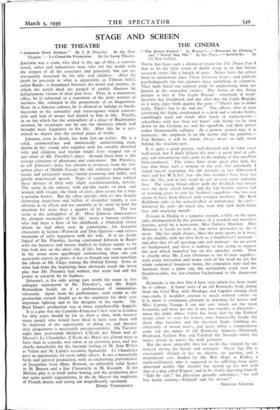THE CINEMA
" The Dawn Patrol." At Warner's.—" Persons in Hiding." and " Never Say Die." At the Plaza.—" Kentucky. ' At the New Gallery.
THERE has been such a chorus of praise for The Dawn Patrol that to let the little worm of doubt creep in on this heroic occasion seems like a breach of taste. Never have the critics been so unanimous since Those Glorious Years—and perhaps psychologically the two pictures have something in commcn. They both flatter our national pride by emphasising what are known as the masculine virtues. The theme of this flying picture is that of The Light Brigade : somebody at head- quarters has blundered, and day after day the Light Brigade, as it were, rides forth against the guns—" Their's not to make reply, Their's but to do and die." The officers who in turn command the flight, condemned to a desk and a whisky bottle, unwillingly send out batch after hatch of replacements— schoolboys with less than ten hours' solo flying—to be shot down by the German ace and his squadron, and their nerves rather histrionically collapse. As a protest against war, it is insincere: the emphasis is on the heroic and the patriotic— Von Richter, it will he noted, always wears an ugly sneer behind his machine-gun.
It is quite a good picture, well-directed and in some cases well-acted, but I don't believe it's true—a great deal of self- pity and romanticism have gone to the making of this excellent ham-sandwich. The critics have made great play with the fact that there isn't a woman in the cast, but personally I found myself regretting the old intruder in her abbreviated skirt and her W.A.A.C. hat—the film wouldn't have been any less like life, and in her stead we get an even more romantic love. The young blond officer with the Frohlich face weeps over the dead school friend, and the kid brother arrives full of morning glory to join his brother's squadron—the last war seems to have been littered with younger brothers. Mr. Basil Rathbone adds to the general effect of melodrama : he can't— whatever his part—do much else with that dark knife-blade face and snapping mouth.
Persons in Hiding is a gangster picture, a little on the tame side, distinguished by the presence of a crooked and merciless heroine, acted by a newcomer, Miss Patricia Morison. Miss Morison is lovely to look at, but never persuades us she is more. She has small chance, since the story opens, as it were, in the middle, with her first theft as a hairdresser's assistant— and after that it's all speeding cars and montage : we are given no background, and there is nothing in her acting to suggest the past which launched her on this anarchic storm. That is exactly what Mr. Lynn Overman as the G-man supplies : with every intonation and weary cock of the head we get the whole contented bourgeois home, the comradely wife and the furniture from a plain van, the melancholy crack over the breakfast-table, the law-abiding background to the dangerous life.
Kentucky is the first film I have seen which has been made by its colour. A banal story of an old Kentucky feud, dating from the Civil War, with Montagu and Capulct owning rival race-studs, it wouldn't amount to much without colour—as it is, there is continuous pleasure in watching the horses and Miss Loretta Young—I am not sure which are the most beautiful; and there are one or two fine touches of direction— when the child, whose father has been shot by the Federal troops come to seize his horses, runs franctically beside the dusty blue breeches and the chestnut flanks babbling in- coherently of brood mares, and again when a commentator reads out the names of old Kentucky winners—Diamond, Rocksand, Gallant Fox and Galahad the Second—while the mares stream by across the wide pastures.
But the most enjoyable film for weeks has slipped by un- noticed among the heroic and romantic. Never Say Die is consistently absurd—it has no dignity, no passion, and a magnificent cast, headed by Mr. Bob Hope as Kidley, a multi-millionaire who is supposed to be suffering from quite abnormal acidity (the chemist has mixed up his test with that of a dog called Kipper) and to be slowly digesting himself. " Side by side," his physician proudly announces, " we will live down eternity—Schmidt and his disease."
GRAHAM GREENE.


























































 Previous page
Previous page